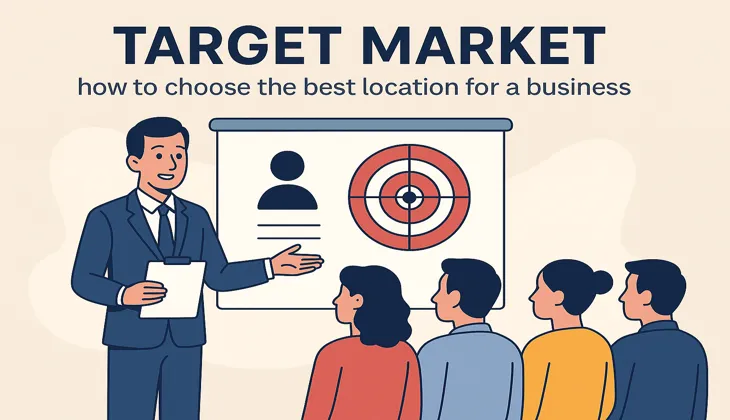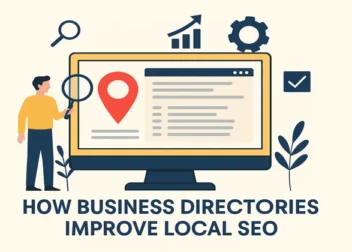10 Things To Keep in Mind While Selecting the Perfect Business Location
📍 10 Things To Keep in Mind While Selecting the Perfect Business Location
Choosing the right spot to set up your business can make or break your success. Whether you’re launching a retail store, café, office, or service center, the location directly influences your visibility, customer reach, and profitability. If you’re wondering how to choose the best location for a business, this comprehensive guide walks you through ten critical factors you must consider.
🧠 1. Understand Your Target Market

Before deciding where to plant your business roots, clearly define who your customers are. Knowing their preferences, income levels, and lifestyle patterns will help you determine the best location for starting a small business. For instance, if your audience is millennials, consider high-footfall urban areas or locations near universities and tech parks.
📊 2. Analyze Foot Traffic

High foot traffic often means higher visibility and potentially more sales, especially for retail or food businesses. Spend time observing different locations at various hours to understand crowd patterns. This is one of the key factors to consider when selecting a business location, particularly for customer-facing establishments.
🚗 3. Accessibility and Parking
Even the most attractive location will lose appeal if it’s hard to reach. Ensure your chosen spot is easily accessible by public transport and offers sufficient parking. Essential factors to consider in a business location include convenience and comfort for both customers and employees.
💸 4. Cost and Affordability
Location rent is often the most considerable fixed cost for small businesses. Weigh your budget against what the location has to offer. A central location might offer higher foot traffic, but it comes at a steep cost. On the other hand, a suburban location might be cheaper, but it is also more complicated to reach. When learning how to choose the best location for a business, striking a balance between budget and benefits is essential.
🏢 5. Competition and Neighboring Businesses
Scout the area to understand the competitive landscape. Too many similar businesses could saturate the market, but some competition also signals strong demand. Sometimes, being near complementary companies, such as a bakery adjacent to a coffee shop, can be mutually beneficial. This is one of the lesser-known yet strategic tips for finding the right business location.
🗺️ 6. Zoning Regulations and Legal Requirements
Check local government zoning laws and permits required for commercial operations in your desired area. Not every place is legally suitable for your kind of business. For example, residential zones may restrict retail or manufacturing activities. These legal factors are crucial considerations when evaluating a business location before signing a lease.
💼 7. Size and Layout of the Premises
The physical structure should suit your operational needs—whether it’s storage, customer seating, or office space. It should also allow flexibility for future expansion. A cramped or oddly shaped space can hinder workflow and negatively impact the customer experience. If you’re looking for the best location for starting a small business, don’t overlook the layout.
🌐 8. Online Visibility and Address Credibility
Believe it or not, your location also affects online perception. An easily recognizable or central address can improve customer trust, especially for service-based or online businesses. It can also enhance your local SEO. When considering the best location for a company, remember that even a digital presence is tied to a physical location.
🧾 9. Utility Availability and Infrastructure
A good location should offer essential utilities, including electricity, water, internet connectivity, and waste disposal. Check for stable supply and hidden costs. Especially if you’re setting up a salon, café, or digital workspace, reliable infrastructure becomes a key aspect to evaluate when selecting a business location.
🔮 10. Future Growth Potential

Don’t just plan for the present. Monitor upcoming developments in the area, such as new highways, malls, residential projects, or government initiatives. These can boost the area’s value and increase your business traffic. A long-term vision is one of the smartest tips for finding the ideal business location.
🧭 Final Thoughts
Choosing a business spot goes far beyond marking a place on the map—it’s a strategic decision that can define your business journey. To recap, key factors to consider when selecting a business location include accessibility, affordability, local competition, legal zoning requirements, and potential growth opportunities. When brainstorming the best location for a business, consider where your customers are, how easily they can reach you, and whether the environment supports your long-term objectives.
Finding the best location for starting a small business may require time and research, but it’s worth the effort. Don’t rush—evaluate your options using these ten checkpoints to make a confident, well-informed choice.
🔑 Bonus Tip: Test Before You Commit

If possible, test the location by hosting a pop-up event, setting up a market stall, or offering a limited-time service. This will provide you with honest feedback and reduce the uncertainty associated with signing a lengthy rental agreement.
By implementing these tips for finding the right business location, you’re setting yourself up for long-term success. Now that you know what to look for, go out there and find a spot that fits your brand, budget, and business dreams!



